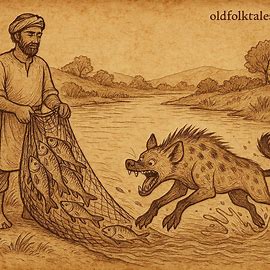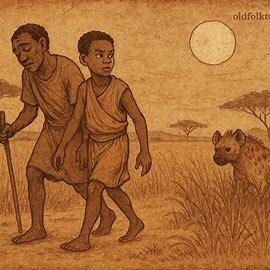Once upon a time, a young man lived with his four brothers. He was the fifth among them, and one day he saw a young woman who pleased him. They married, and for four days, the new bride observed the customs of her brideship, remaining in seclusion. When the period ended, she was brought out to join the household and begin her life as a wife.
She took her place in the home and prepared to show her diligence and skill. She set a pot of mush upon the fire, stirring patiently until it was well cooked. When it was ready, she carefully took out one dishful for her husband and four more for her brothers-in-law. Carrying the food with care, she went to offer it to them as a gesture of respect.
But the brothers-in-law would not receive it so easily. “If we are to eat your mush,” they said, “you must first tell us our names.”
READ THIS: The Son of Kimanaueze and the Daughter of Sun and Moon: A Kimbundu Folktale
The young woman grew uneasy, for she did not know their names. “Your names, I know them not,” she admitted softly.
“Then take away your mush,” they replied firmly. Shamed and disheartened, she carried the food back into her house. That evening, she and her husband ate their own share quietly and went to sleep.
The next morning, she tried again. She cooked mush, set it before her husband, and prepared dishes for the brothers-in-law. Once more she brought it to them, but again they demanded, “If we are to eat, tell us our names.” And again, she had no answer. “Your names, I do not know,” she said. They refused the food, and once more she returned to her house, troubled and confused.
That night she lay awake, thinking: My brothers-in-law continue to reject the food I prepare. I do not know their names, yet how can I discover them?
The following day passed, and when evening came, the bride resolved to pound some mbombo in the mortar. She gathered the grains, placed them in the mortar, and began to pound steadily with her pestle.
As she worked, a small bird flew down and perched on the branches of a tree beside her. In a clear, lilting voice, the little bird began to sing:
“Thy brothers-in-law these,
Thou knowest not their names?
Listen, I will tell thee!
One is Tumba Sikundu,
One is Tumba Sikundu Mund!
One is Tumba Kaulu,
One is Tumba Kaulu Mund!
Listen, I have told thee!”
The bride frowned. To her, the bird’s song was a nuisance. She threw down her pestle, seized a stone, and chased the bird away, crying, “You trouble me with your noise!” The bird fluttered off into the distance, and she finished her pounding alone.
Later she cooked mush once more, but when she offered it to her brothers-in-law, the scene repeated itself. “Tell us our names,” they insisted. Again, she could not. Again, they refused. Again, she left, disappointed.
The next morning, she returned to the mortar to pound more mbombo. Once again, the little bird flew down and began its song:
“Thy brothers-in-law these,
Thou knowest not their names?
Listen, I will tell thee!
One is Tumba Sikundu,
One is Tumba Sikundu Mund!
One is Tumba Kaulu,
One is Tumba Kaulu Muna!
Listen, I have told thee!”
This time, the woman paused. Though she chased the bird again, its words echoed in her mind. As she pounded, she thought carefully: The little bird repeats the same names every time. Perhaps it is not mere noise. Perhaps it is teaching me what I must know.
At last, she realized: the bird had been revealing the names of her brothers-in-law. A smile crossed her face as the pounding ended and the mush was cooked once more.
When she brought the food to her brothers-in-law that day, they repeated their challenge. “If we shall eat thy mush, tell us our names.”
The young woman lifted her head proudly and said with confidence: “This one is Tumba Sikundu. This one is Tumba Sikundu Muna. This one is Tumba Kaulu. This one is Tumba Kaulu Muna.”
Her brothers-in-law laughed with delight, amused and impressed. At last, they accepted the mush and ate heartily. From that day onward, the bride and her husband lived peacefully among his brothers, and she was never troubled again.
And so, the tale is told: a young man married a wife, and though she did not know her brothers-in-law’s names, a little bird revealed them through song.
Moral Lesson
This folktale teaches that knowledge often comes in unexpected ways, and wisdom lies in listening carefully, even to voices we may first dismiss. The bride at first rejected the bird’s song as meaningless noise, but only when she paid attention did she discover the solution to her problem.
It reminds us that humility, patience, and attentiveness are keys to overcoming challenges, and that help may come from the smallest and most unlikely of places.
Knowledge Check
Q1: Who were the main characters in the story?
A young bride, her husband, his four brothers, and the singing bird.
Q2: What task did the bride perform that led to the bird’s appearance?
She was pounding mbombo in the mortar when the bird sang.
Q3: Why did the brothers-in-law refuse to eat her mush at first?
They demanded that she tell them their names, which she did not know.
Q4: What lesson did the bird’s song reveal?
It revealed the names of her brothers-in-law: Tumba Sikundu, Tumba Sikundu Muna, Tumba Kaulu, and Tumba Kaulu Muna.
Q5: What is the moral of the story?
To value attentiveness and humility, and to recognize that wisdom may come from unexpected sources.
Q6: From which culture does this folktale originate?
It is a Kimbundu folktale from Angola.
Source: Kimbundu folktale, Angola (from Folktales of Angola, Heli Chatelain, 1894, Smithsonian Libraries Digital Collections).







